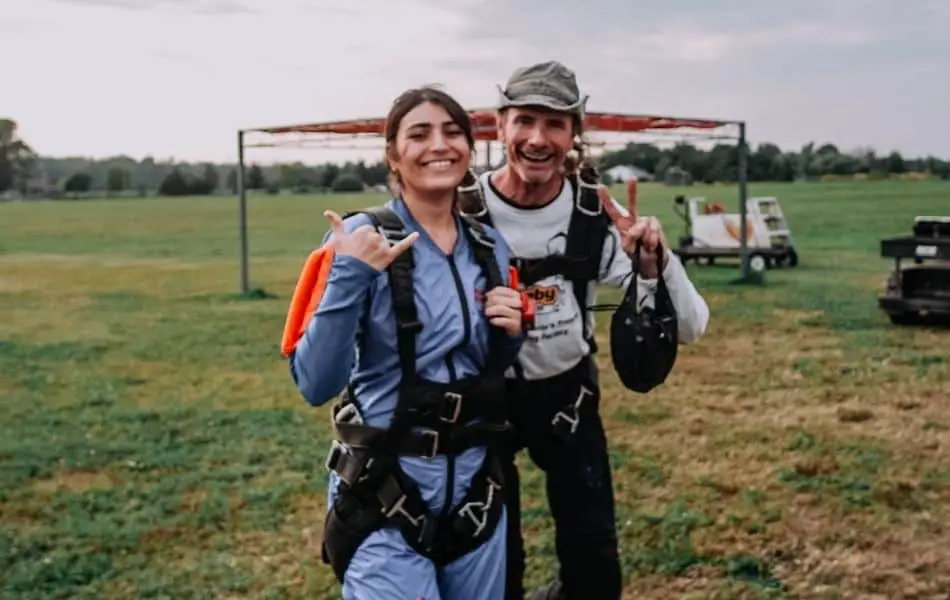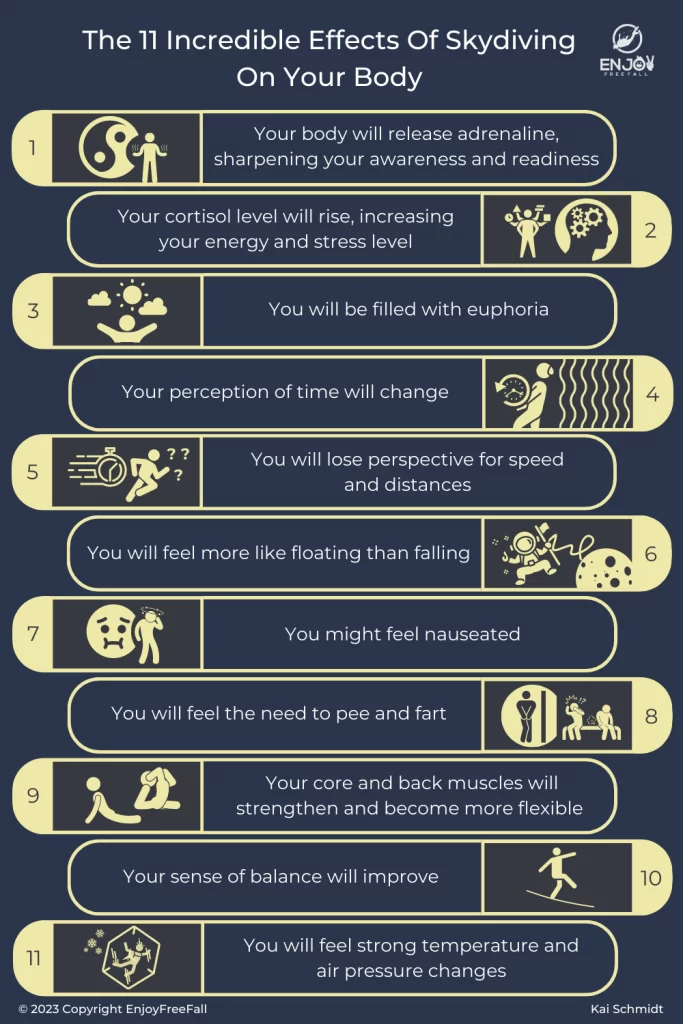
Skydiving is one of the few extreme sports that regular people can do without a lot of preparation. As such, many people ask themselves about the effects that skydiving has on the human body.
The human body will release several hormones such as adrenaline, cortisol, and dopamine in the blood circulations that will help people to think and act quicker. The muscles will also tense and people will lose perspective for speed, distance, and time. I have summarized the 11 greatest effects below.
- Your body will release adrenaline
- Your cortisol levels will rise
- Serotonin and dopamine will be released after the skydive
- The brain sends out different chemicals
- You will feel the need to pee and fart
- You lose perspective for speed and distances
- It does not feel like falling
- Some people will experience nausea during or after the skydive
- Freefalling gives you an improved sense of balances
- Your core and back muscles will strengthen and become more flexible
- Your body is exposed to strong temperature and air pressure changes
The Different Hormones That Will Be Released To Your Body When Skydiving
When going skydiving your body will release different kinds of hormones that have different impacts on your body and mind. While the type of hormone does not differ from person to person the amount of hormones differs strongly. The different levels of hormones also result in a different perception and experience of the skydive (or are a result of those).
The Role Of Adrenaline During Your Skydive
The most important hormone that is released during and before a skydive is adrenaline. Whenever your body is confronted with danger or a challenge it will initiate the so-called fight-or-flight response in which huge amounts of adrenaline are released. In general, adrenaline has performance-boosting effects and increases your physical abilities strongly.
The first impact of adrenaline is that it empowers your muscles and makes them much stronger. The adrenaline will make your blood run faster such that the muscles are supplied with more oxygen and energy. Adrenaline will also trigger the release of proteins and special enzymes that enhance your muscle strengths.
Adrenaline also increases your heart rate drastically. The increased heart rate will increase your blood pressure and make your blood move faster. You are likely to experience this through a feeling of heat and tension throughout your body.
The increased blood flow together with the adrenaline will also supply your brain with more glucose. Glucose is the most important energy provider for our brains. As a result, you will be able to perceive your environment much faster and to think much quicker.
Your reaction time to external factors will also be much shorter. This can be extremely useful in skydiving as it allows you to resolve any problem much faster. Sometimes being 2-3 seconds faster in resolving parachute malfunctions such as line entanglements can decide between death and life.
If you want to know how much reaction time skydivers have to resolve issues during the parachute deployment process, feel free to refer to my guide on when to pull the parachute. It also includes tips and tricks to ensure a safe parachute deployment.
Another effect of adrenaline that can be quite useful in skydiving is that it helps you withstand much more pain. In fact, adrenaline stops your brain from receiving pain signals such that you do not even realize that you might be injured.
Pain, in general, is meant to protect us from damaging our body, however, in the fight-or-flight state, our body prioritizes short-term survival over long-term effects.
Withstanding more pain is helpful during skydiving because you might be able to stretch yourself more and reach certain entangled robes. It also helps to hold positions that are painful on the one hand but are needed in order to solve certain problems on the other hand.
If you perform a tandem jump, you should not worry about this. Your tandem instructor will resolve any problem, so you will not need to leverage the positive effects of adrenaline (your body will nonetheless send adrenaline out).
If you are performing a tandem jump soon, make sure that you check out my skydiving 101: everything you need to know about your tandem landing. It explains in detail what you as a tandem student can do to ensure a safe landing!
The Meaning Of Changes In Your Cortisol Levels During And After Skydiving
In anticipation of the jump, you are likely to feel anxious and nervous. This usually results in the release of cortisol to the bloodstream. Cortisol is one of the hormones that control our stress levels.
When being released, it speeds up our gluconeogenesis and metabolism of carbohydrates, proteins, and fat – which are responsible for our energy production. In other words, it speeds up our energy production drastically.
As a result, you will experience an increase in your blood sugar and a boost in your energy levels. While cortisol has great short-term effects, it has long-lasting side effects if you are constantly exposed to it. Cortisol suppresses your immune systems, decreases bone formation, and increases your blood pressure.
Unfortunately, our bodies also often send out cortisol to every day’s challenges such as an angry spouse or temperamental boss. This constant exposure to too much cortisol is one of the biggest health threats in our current society. Doing skydiving on a regular basis can in fact counteract these effects.
When you experience real danger on an ongoing basis, you are less likely to send out cortisol to every day’s challenges that you only perceived as being dangerous even if they are not.
Dopamine And Serotonin Will Fill You With Euphoria After The Skydive
Increased cortisol levels are often counteracted by dopamine and serotonin after you landed safely at the dropzone. You will feel not only released from the danger but also proud because you dared to jump. This sense of achievement results in dopamine and serotonin release (or is a result thereof) and will bring you to a stage of ecstasy and wakefulness. You will feel energized, excited, and invincible.
Dopamine specifically plays an important role in the stress resilience of people. New studies have shown that increased dopamine levels help people turn stress into a positive experience and therefore eliminate the negative effects of stress.
You can also use this feeling to your own advantage months after your skydive. Whenever you feel stressed or pressured by something, try to revive the moment of your jump and the feeling afterward. Your body will react by sending out small doses of dopamine which will make you feel better and more energized.
Would you like to know what can help to revive these life-changing moments? Read my article about the 5 reasons why skydiving videos are worth it. The reasons will change your perspective on skydiving!
Different Chemical In Your Brain Will Change Your Perception Of Time
Your perception of time depends a lot on your emotional state – which again is a function of different chemicals in your brain (including dopamine and serotonin). In general, it holds true that time flows faster if you are in a positive emotional state and enjoy the experience. If you, in contrast, are in a negative emotional state and do not enjoy an experience the time will slow down.
Skydiving gives different feelings that are difficult to fully capture and comprehend. If you’d like to learn more and shed light on this phenomenon, read my article about the 7 true feelings of skydiving.
This effect holds not only true in general but also has been scientifically proven by researchers when studying novice skydivers (you can find the link to the research paper here.) Novice skydivers had to evaluate their experience before and after their jump and then were asked how long they had been in the air.
People who rated their experience highly estimated a much lower freefall time than people who did not enjoy the experience. It also makes sense evolutionary for your brain to perceive time slower when not enjoying an experience. An unenjoyable experience is often connected to (perceived) danger and it helps a lot if you are able to react faster because time flows slower for you.

Your Body Loses Perspectives And References When Skydiving
While you feel the changes in hormones emotionally, you will feel the changes in perspective through your mind.
Your Body Loses Perspective For Speed And Distances When Skydiving
When you are 14,000ft above the earth your eyes do not have any fix points for reference anymore. You know that you are really high above the ground but you do not know whether you are 5,000ft, 20,000ft, or 30,000ft above the ground. You will also not know how fast the aircraft flies or how fast you fall.
A result of this is that people who are afraid of extreme height can still skydive. As our body does not realize the heights, it is not as scary as standing on a cliff or a high tower. Due to this, skydiving is a great treatment against acrophobia (being scared of extreme heights).
If you want to read more about 7 reasons why you should skydive when being scared of heights, check out this article that I wrote.
It Does Not Feel Like Falling When Skydiving
When you jump out of the airplane, gravity will pull you down to earth and your falling speed will constantly accelerate until you have reached terminal velocity. Tandem skydivers often reach terminal velocity after 14 seconds at a speed of 270 mph. Terminal velocity means that your falling speed has reached its maximum.
Terminal velocity is reached once the air resistance equals the gravitational pull of the earth. When this happens, it feels like you have a giant air pillow below you. It does not feel like falling anymore but as you were flying through the air.
Enjoying the terminal velocity during freefall is one of the amazing feelings that your body can have because it is not used to it.
Some People Have Nausea During And After The Skydive
Some people, however, do not enjoy the feeling of freefall because they will get nausea from it. Nausea in skydiving is caused by “motion sickness”. Motion sickness is much less common in skydiving than in other activities that involve high speeds. As aforementioned, your body will lose perspective for speed and freefalling does not feel like falling.
Nonetheless, it can still happen to some people. In order to prevent nausea people with motion-sickness should rest well before going skydiving. They should also drink enough water and make sure that they eat a small snack such as a banana.
Physical Effects Of Skydiving On Your Body
Not only does your body release a hormone cocktail to your bloodstream before and during a skydive, it also has impacts on your muscles and inner organs. While skydiving has some short-term physical impacts on your body, the greatest impacts are made when jumping regularly and solo.
You Will Feel The Need To Pee And Fart Before The Skydiving
Due to the increased level of adrenaline, cortisol, and anxiety, your body will feel much tenser. Tension means that your body is ready to react to any danger quickly. However, this also has an impact on your organs.
The muscles of and around your bladder will be tensed as well. As a result, you will feel an increased need to pee. I, therefore, advise you to pee before stepping into the airplane. I remember that I had to pee twice – one time when I arrived at the dropzone and one time after I put on my jumpsuit and got really excited.
If you wonder whether you will be able to hold your bladder during skydiving, check out my article answering the question do you pee while skydiving. It also includes some easy tips to cope with the feeling!
You will experience a similar effect on your stomach and butt. Because of the increased muscle tensions, you are more likely to fart – something that is called anxiety-farts.
Do not worry too much if you have to fart before or during your skydive. When it happens in the fall your tandem instructor will not notice it. If it happens before the jump, the tandem instructor will understand.
After all, you will not be the first one who farts before a skydive!
Increased Strength and Flexibility When Skydiving Regularly
While adrenaline will give you more flexibility and strength in the short-term, skydiving regularly will increase your muscle strength and flexibility in the long-term.
Skydiving can be physically tough specifically from carrying heavy gears around, keeping your balance in the air, and steering the parachute. You are likely to increase your core strength and to strengthen your back muscles.
Although flexibility is not trained as much as your body strength during a skydive, it still improves and skydivers are often more motivated to stretch regularly. They know that being flexible will help them enjoy their skydive more and can make a real difference in case of any turbulence. Flexibility also helps prevent serious injuries that can happen specifically during landing.
Besides this, skydiving is a good physical workout. If you are interested in knowing more about skydiving as a workout, you can refer to this article. I have also written an article about the 9 physical and mental advantages of skydiving regularly here.
Freefalling Improves Your Sense Of Balance
The first thing that you need to do after you jump off the plane is to stabilize your position. You will need to activate different muscles in order to track through the air or to turn arounds. Depending on the weather conditions you might also be exposed to some wind that can make it harder for you to maneuver your body.
Once you have reached terminal velocity, it does not feel like falling anymore and you will be able to “fly” through the air. This is an amazing feeling and although you might not feel it at first but also very demanding physically and cognitively. The more you jump, the better your sense of balance will be, and the safer you will fly through the air.
For novice solo skydivers it can be quite challenging to keep their balance at first. Due to this, they will always be accompanied by one or two instructors that jump beside them in order to hold them in the right position. After some time they will build up their muscle memories and will be able to stabilize themselves alone.
Novice skydivers are also likely to recognize their improved sense of balance when doing other sports. I was amazed to see how much my skiing skills improved after I picked up skydiving.
Your Body Experiences Strong Temperature And Air Pressure Changes
As you can imagine, there is a strong difference in the temperature and air pressure between 14,000ft (4,200m) and the ground. For example, the temperature can be 75°F (24°C) lower in the sky than on the ground. In addition, you will fall at a speed of more than 120 mph such that the perceived temperature is even lower. Air pressure is also significantly lower in the sky than on the ground.
While everyone knows how quick and strong temperature changes feel like, experiencing air pressure changes is not as common. It feels the same as taking off with a plane but much stronger. You will feel pressure on your ears and nose and should release this pressure by yawning. You can also choose to shout out loud – it will also release the air pressure.
Although quick changes in air pressure might feel uncomfortable sometimes, it does not put any health threats on your body if you are healthy. If you have any chronic diseases you should check with your doctor before skydiving.
If you are sick, you should not go skydiving as it puts several risks on you and others. I have written another article about the 7 things that go wrong when skydiving sick. You can read it here.
Is There A Difference Between Tandem And Solo Skydives?
While there is no difference in the type of effect on the body when jumping tandem and solo, the above mentioned effects on your body will likely to be much stronger. Specifically, the different hormone releases can make a strong difference between tandem and solo jumps.
Solo skydiving will also be physically more exhausting because you need to make every movement yourself and you need to carry around the skydiving gear.
How Does The Jumping Altitude Impact Your Body?
There is no real difference between jumping from 10,000ft and 15,000ft. If you do perform HALO jumps (high altitude low openings), you will experience higher terminal velocity and higher changes in air pressure. You will also fall much longer, and therefore the effects on your body are much stronger.
That being said, enjoy your free fall!




